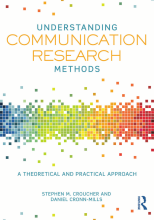Research Paradigms - The Social Scientific Paradigm - Key Questions for Social Science
11 important questions on Research Paradigms - The Social Scientific Paradigm - Key Questions for Social Science
What are 9 key questions for social sciences?
2. What is the purpose of research?
3. What is reality?
4. What is human nature?
5. Do humans have free will?
6. What is theory?
7. How do you determine if an explanation is good or bad?
8. How do you determine good and bad claims?
9. What is the place of values in social sciences?
Can the "social" part of social science be very unpredictable (The 1st key question for social sciences)
Can the "social" part of social science be very unpredictable (The 1st key question for social sciences)
- Higher grades + faster learning
- Never study anything twice
- 100% sure, 100% understanding
Is a key question to ask in every research paradigm "what is the ultimate purpose of the research?" (The 2nd key question for social sciences)
What is reality for social scientists? There are 2 aspects (The 3rd key question for social sciences)
2. Social scientists view reality as generally stable: our traits and behavior do not change over time, which is why we can conduct research today about human behaviors that can hopefully be viable in the future.
What is human nature to social scientists? (The 4th key question for social sciences)
Do humans have free will? (The 5th key question for social sciences)
What is theory for social scientists? (The 6th key question for social sciences)
A social scientific theory involves the following:
1. A theory can be descriptive, predictive and/or causal in its explanation(s).
2. A theory should clearly outline the situations under which it operates and/or applies
3. For social scientists, a theory should typically have axioms, postulates and theorems, which add to testability of theories.
4. A theory should (if possible) be applicable in various cultural contexts.
How do you determine if an explanation/result is good or bad? (The 7th key question for social sciences)
1. Are the results logical? If contradicting, what is the logical response for it or if your results are new: what is the logical explanation for it
2. Replication is key in social science (= repeating experiment to make sure it works the same way for every researcher every time)
How do you determine good and bad claims? (The 8th key question for social sciences)
What is the place of values in social science? (The 9th key question for social sciences)
The question on the page originate from the summary of the following study material:
- A unique study and practice tool
- Never study anything twice again
- Get the grades you hope for
- 100% sure, 100% understanding































